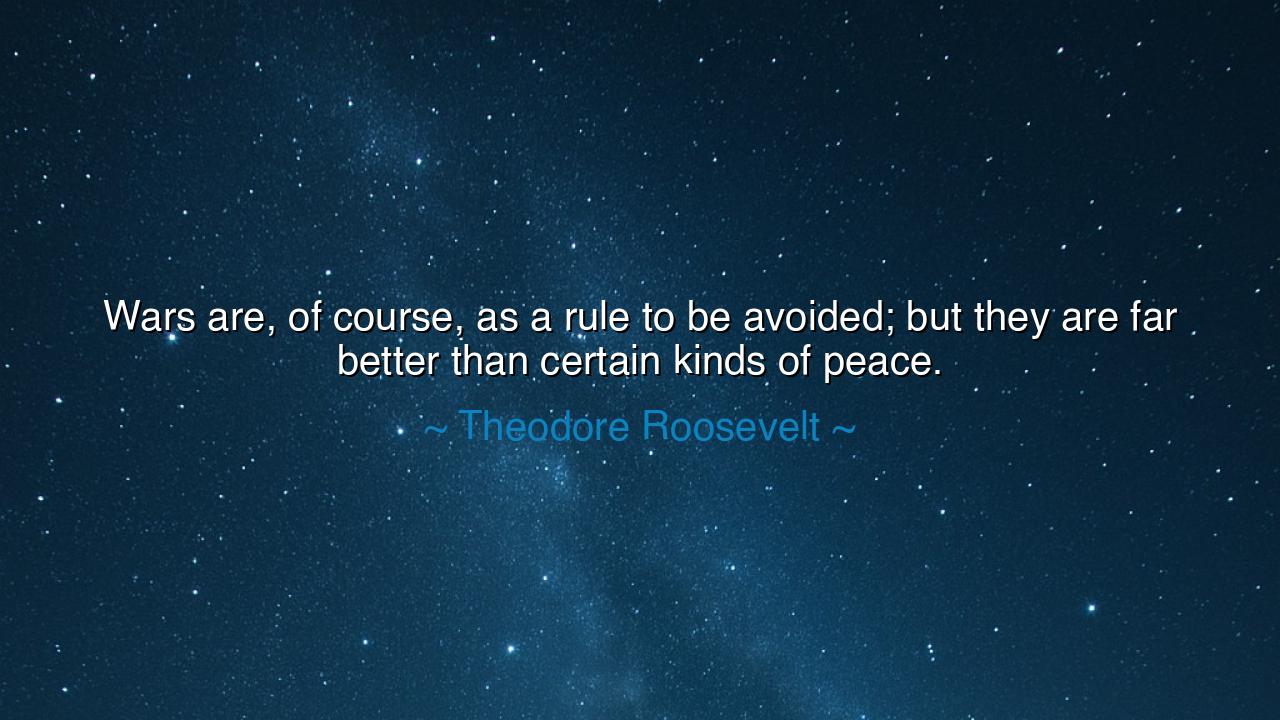
Wars are, of course, as a rule to be avoided; but they are far
Wars are, of course, as a rule to be avoided; but they are far better than certain kinds of peace.






Hear the fiery words of the Rough Rider, Theodore Roosevelt, who declared with the certainty of a soldier and the vision of a statesman: “Wars are, of course, as a rule to be avoided; but they are far better than certain kinds of peace.” In this utterance lies a paradox, yet also a timeless truth. For though war is a scourge, bringing grief and destruction, there are moments in history when a hollow or unjust peace is worse than the clash of arms. Roosevelt, who knew both the battlefield and the halls of power, speaks here of the moral duty to resist false peace—the peace of submission, cowardice, or dishonor.
What is meant by “certain kinds of peace”? It is the peace that enslaves rather than liberates, the peace that is bought by silence in the face of tyranny, the peace that cloaks corruption and allows injustice to thrive unchallenged. Such peace is not peace at all, but stagnation, a living death for nations and peoples. Against this, Roosevelt insists, it is nobler to endure the fires of war, if only to protect the dignity and freedom of the human soul.
History gives us many examples. Recall the fate of the Athenians when confronted by the Persian Empire. They could have chosen submission, accepting the so-called “peace” of vassalage under Xerxes. Yet such peace would have stripped them of freedom, culture, and honor. Instead, they fought at Marathon and later at Salamis, enduring bloodshed and peril. Their sacrifice lit the flame of democracy and shaped the destiny of Western civilization. Here Roosevelt’s meaning is revealed: a perilous war may yield life and liberty, while a dishonorable peace can extinguish both.
So too in the modern age. When Europe appeased Hitler at Munich in 1938, they sought “peace in our time.” But it was a false peace, a cowardly compromise that surrendered truth and emboldened evil. That year of silence cost millions of lives, for war came regardless, and with it horrors multiplied by the delay. Yet when finally nations rose to resist, though the conflict was terrible, it was also righteous—a war that restored dignity and crushed tyranny. Better, indeed, was that war than the peace of Munich.
Roosevelt’s words also speak to the heart of every individual. In our own lives, how often do we seek “peace” by avoiding confrontation, by silencing truth, by allowing wrongs to continue unchallenged? Such peace corrodes the soul. There are moments when the harder path—standing firm, speaking out, even facing conflict—is far better than living in comfort at the cost of justice. A man or woman of virtue will sometimes choose strife over silence, struggle over submission, because they know that real peace cannot be built upon cowardice.
O children of tomorrow, take heed: do not misunderstand. Roosevelt does not glorify war nor call men recklessly to arms. He acknowledges that as a rule it is to be avoided, for it brings sorrow and destruction. But he teaches us discernment—that one must weigh the nature of peace itself. Ask: is this peace founded on justice, or is it the mask of oppression? Is it the quiet of harmony, or the silence of fear? If it is the latter, then better the storm of conflict than the stillness of chains.
Thus, the lesson is clear: pursue peace, but pursue the right kind of peace. Strive for harmony built on justice, on freedom, on truth. But never accept the false peace that demands your honor or the dignity of others as its price. In your life, in your community, in your nation, remember Roosevelt’s words: when faced with the choice between dishonorable peace and just struggle, choose struggle. For from such courage springs not only victory, but the possibility of a peace that is real, enduring, and worthy of the human spirit.






AAdministratorAdministrator
Welcome, honored guests. Please leave a comment, we will respond soon